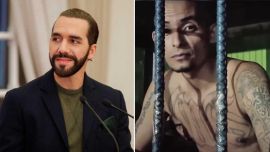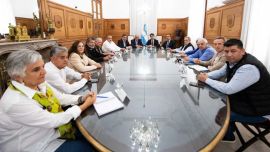At odds with his fellow justices in the nation’s highest court, Rosenkrantz was also challenged on Tuesday by most of the investigative federal judges who work the Comodoro Py courthouse, many of whom chose not to attend the ceremonial address.
“The crisis of legitimacy is partly a crisis of trust, and the growing distrust of our citizens with the Judiciary has been born partly because there is a suspicion that we serve interests other than the law,” Rosenkrantz told judges, members of the Magistrates Council and Justice Minister Germán Garavano, who had gathered on the fourth floor of the central courthouse.
“We must show that this is not the case,” he declared.
As he spoke, the four other members of the tribunal seated behind him were listening extra carefully to the speech. Unlike his predecessor who led the court, Ricardo Lorenzetti, Rosenkrantz did not tell the other justices what issues he was going to address in his first inaugural speech.
Viewed as an ally of President Mauricio Macri, Rosenkrantz’s address did not please the other members of the Supreme Court. Some judicial sources criticised the chief justice for not having addressed the topic of judicial independence – the country’s court system is currently engulfed in scandal, with allegations emerging about an illegal espionage ring with deep roots in the Judiciary. Others judges highlighted the noticeable absence of many of those conducting the most sensitive investigations in the Comodoro Py courthouse.
Although most of those from the Federal Criminal Cassation Court and the Federal Criminal Court of Appeals were present, the distinguishing feature was that only Daniel Rafecas and Sebastián Casanello attended the ceremony. However, organisers had seated them at the back of the room, far from the stellar seats that Lorenzetti used to reserve them.
The other judges who weren’t present – including Martin Irurzun, the head of the Federal Criminal Court of Appeals who is responsible for the Supreme Court’s wiretapping office – kept track of the speech from their chambers inside the Comodoro Py courthouse. Afterwards, some described the address as “simplistic,” saying it was from someone who is “unaware of how the Judiciary works.” Mere minutes after the address had finished, another federal judge – who also boycotted the event and stayed at the courthouse located in Retiro – accused Rosenkrantz of “grandstanding.”
Outsider
Rosenkrantz, a lawyer and former rector of the University of San Andrés (2008 to 2015), became a member of the Judiciary when he was appointed to the Supreme Court in 2016.
Along with Horacio Rosatti, he was nominated by Mauricio Macri to take office as an acting Supreme Court justice by decree, without the Senate’s approval, which triggered a scandal within the Cambiemos (Let’s Change) coalition. The president eventually backtracked.
In the 1980s, Rosenkrantz was one of an elite group of four young lawyers who worked with jurist Carlos Nino, adviser to then-president Raúl Alfonsín. He then went on to complete his doctorate at Yale. Upon his return to Argentina, Rosenkrantz founded a law firm with two former colleagues, Gabriel Bouzat and Agustín Zbar, who currently leads the AMIA (Asociación Mutual Israelita Argentina) Jewish community organisation.
Today, at the Talcahuano Palace, Rosenkrantz is considered the driving force behind the controversial Luis Muiña ruling, which authorised the application of 2017’s ‘2x1’ timeserved benefit for dictatorship-era criminals convicted of human rights crimes. In September, with the support of justices Rosatti and Elena Highton de Nolasco, he replaced Lorenzetti at the helm of the country’s top tribunal. Described by some as a coup – with the trio who opted for change having agreed to the shift before approaching Lorenzetti – the renewal of authorities has thrust the members of the Supreme Court into a cold war.
However, things have changed since October, when Rosenkrantz assumed the leadership of the court. Lorenzetti, Rosatti and Juan Carlos Maqueda seem to have formed a bloc that normally sides against the Macri administration in the votes, with the government now describing them as the “Peronist majority.” On Tuesday, Lorenzetti made it clear that he still has allies within the Comodoro Py courthouse.
related news

Crisis at Human Capital Ministry: abrupt exits and resignations disrupt Sandra Pettovello’s portfolio

Middle class puts first limit on Milei’s chainsaw

Mercosur free-trade deal is ‘absolute priority’ for the EU, says chief negotiator


















Comments